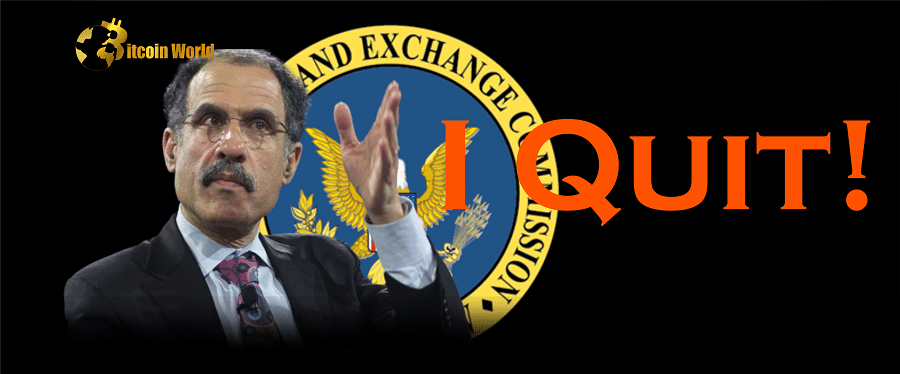The cryptocurrency world is still reeling from the FTX collapse, and now, another significant development has emerged from the regulatory front. Dan Berkovitz, the General Counsel of the United States Securities and Exchange Commission (SEC), has announced his departure, effective January 31st. This news arrives amidst growing scrutiny over his alleged close relationship with FTX founder Sam Bankman-Fried (SBF) and his now-bankrupt crypto exchange.
Why is the SEC General Counsel’s Departure Raising Eyebrows?
Berkovitz’s resignation, initially reported by the Washington Examiner on December 22nd, comes at a particularly sensitive time. Just as SBF was granted a staggering $250 million bail, reports surfaced detailing a seemingly comfortable rapport between the SEC’s top lawyer and the FTX executive. According to reports, this relationship included meetings and dinners, raising questions about potential conflicts of interest and regulatory favoritism.
But what exactly fuels these concerns?
- “Cozy Relationship” Allegations: Watchdog group Protect the Public Trust revealed emails indicating meetings between Berkovitz and FTX executives, including SBF, FTX General Counsel Ryne Miller, and FTX President Brett Harrison. These meetings reportedly took place at upscale restaurants, suggesting a level of familiarity that some find inappropriate, especially given the SEC’s regulatory role over FTX.
- Timing is Everything: The announcement of Berkovitz’s departure coinciding with SBF’s bail adds fuel to the fire. Critics question whether the resignation is a preemptive move to avoid further investigation into his dealings with FTX.
- Senator Emmer’s Concerns: Republican Senator Tom Emmer has publicly stated his unease about multiple meetings between the SEC and FTX. He suggested these interactions might have been aimed at crafting a favorable regulatory framework specifically for FTX, potentially giving them an unfair advantage in the market.
What Did These “Cozy” Meetings Entail?
Details are still emerging, but reports indicate at least one notable meeting in October 2021 at a luxury restaurant. According to Michael Chamberlain, director of Protect the Public’s Trust, this scene paints a concerning picture of potential insider influence in Washington D.C. He suggests SBF and his team might have been attempting to sway regulators to manipulate rules in their favor, just before FTX’s dramatic downfall and subsequent fraud allegations.
Senator Emmer echoed these concerns, highlighting the broader issue of regulatory capture. He directly challenged SEC Chair Gary Gensler’s assertion of using “every tool” for compliance, stating that “making backroom regulatory deals with bad actors is not a tool in the SEC’s toolbox.”
Gary Gensler’s Own Meetings with SBF: A Deeper Dive
Adding another layer to this complex situation, it’s been revealed that SEC Chair Gary Gensler himself met with Sam Bankman-Fried approximately eight months before FTX imploded. The discussions reportedly centered around a novel concept: a new SEC-approved crypto trading platform. Had this platform received the green light, it could have provided SBF’s empire with a significant competitive edge within the burgeoning crypto market.
This revelation has intensified criticism, with figures like Democratic Rep. Ritchie Torres directly blaming Gensler for the FTX debacle. Torres stated unequivocally, “When it comes to FTX, Chair Gensler fundamentally failed as a regulator, and he bears sole responsibility.”
The Wider Web: Were Politicians Also Involved?
The FTX saga seems to extend beyond just regulators and crypto executives. Reports indicate that even figures like anti-crypto Senator Elizabeth Warren have connections to the Bankman-Fried family. While the exact nature of these ties is still under scrutiny, it suggests a potentially far-reaching network of influence.
Key Takeaways and Questions Moving Forward
The resignation of SEC General Counsel Dan Berkovitz amidst FTX scrutiny raises critical questions about regulatory oversight and potential conflicts of interest. Here are some key takeaways:
- Erosion of Public Trust: These reports, whether fully substantiated or not, contribute to a growing distrust in regulatory bodies. The perception of cozy relationships between regulators and the industries they oversee can severely damage public confidence.
- Need for Transparency: The SEC and other regulatory agencies need to demonstrate greater transparency in their interactions with industry players, especially in rapidly evolving sectors like cryptocurrency.
- Independent Oversight: The FTX collapse highlights the crucial need for robust and independent oversight of regulatory bodies themselves. Mechanisms to prevent regulatory capture and ensure accountability are paramount.
- Unanswered Questions: Many questions remain unanswered. What was the full extent of the relationship between Berkovitz and FTX executives? Did these interactions influence regulatory decisions? Will there be further investigations into these matters?
The Road Ahead for Crypto Regulation
The FTX scandal and the surrounding controversies are likely to accelerate the push for clearer and stricter crypto regulations. The spotlight is now firmly on regulatory bodies to demonstrate their impartiality and effectiveness in protecting investors and maintaining market integrity. As Michael Chamberlain aptly stated, “While the collapse of FTX and the behavior of its executives has certainly made a lot of news, the actions of federal officials should also be under scrutiny.” The crypto community, and indeed the wider public, will be watching closely to see how these developments unfold and what lessons are learned from this unfolding saga.
Disclaimer: The information provided is not trading advice, Bitcoinworld.co.in holds no liability for any investments made based on the information provided on this page. We strongly recommend independent research and/or consultation with a qualified professional before making any investment decisions.




